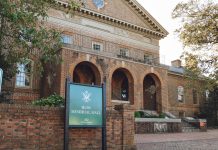While slaves have been absent from the College of William and Mary since the nineteenth century, their cultural legacy remains a source of continued scholarship. The College’s 24th annual Southern Intellectual History Circle began its program Thursday with a keynote presentation on Caribbean slave culture and its relation to the Atlantic theatre.
Duke University professor of French studies and history Laurent Dubois’ lecture was titled “Voltaire and Dessalines in the Theatre of the Atlantic.” He discussed the influence of French philosopher Voltaire in the Caribbean around the time of the Haitian Revolution.
“Making his own contribution to the vogue of plays in the Americas, Voltaire made his unique contribution to the work of other [playwrights],” Dubois said.
Dubois, also the director of the John Hope Franklin Humanities Institute Haiti Lab at Duke, has written seven books about the Francophone influence on Atlantic culture. The latest was reviewed on the front page of The New York Times Book Review. He is the recipient of multiple fellowships and research grants from both American and French organizations.
Dubois emphasized the underappreciated relationship between Caribbean culture and European empires.
“We needed to rethink the history of the Enlightenment … by expanding our analysis beyond Europe and integrating what I call an intellectual history of the slave into this history,” Dubois said.
Some of the presentation also examined the direct critiques that Caribbean theater offered of slave culture. Not only wealthy slave owners, but also free blacks and slaves frequented many playhouses of the period.
“Plantation owners would leave their estates and go into town to see plantation life portrayed onstage,” Dubois said. “The theater dealt with and confronted the plantation culture of its day. … The theater nonetheless was extremely popular in both cities and small towns.”
English Department Chair and professor of American studies Susan Donaldson was instrumental in selecting Dubois as the keynote speaker for this year. She is quick to note his qualifications for the honor and within his field of study.
“He is doing terrific work on the Caribbean and is a top scholar on the subject,” she said. “He is doing very important work on the Haitian Revolution. His books have won numerous prizes; he is pioneering a path in Atlantic studies.”
Dubois noted the significance of Caribbean plays on the culture of both slaves and slave owners alike. He added an anecdote about the Creole language in some plays he studies.
“About 5 percent of the plays were written in Creole, being the first language texts in Creole, starting in the 1750s,” he said.
Director of the Omohundro Institute of Early American History and Culture and professor of history Ron Hoffman introduced Dubois’ paper presentation. He shares Donaldson’s enthusiasm for his academic work.
“We’ve published his work and given the subject that he attested to this evening, he is probably the foremost scholar in the field … very advanced,” Hoffman said.
The program continues Friday and Saturday with events ranging from guest presentations to rebuttal discussions, and a guided tour of slave sites at the College. All events are open to the public, and more information on the conference can be found on the English Department’s website.



































